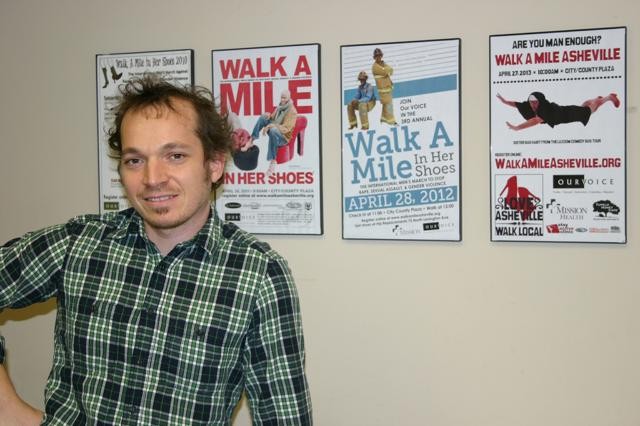- Ezra Post, the only male counselor at Our VOICE rape crisis center, coordinates the new One in Six project for men. Nichole Civiello
- Nichole Civiello
Six years ago, John Langlois sat in a counselor’s waiting room and began to fill out a standard intake form. At the time, he was a 50-year-old, local family physician and workaholic seeking help after a job-related burnout. One of the questions on the form asked whether he had ever been a victim of physical, sexual or emotional violence or trauma. “No one had ever asked me that question in my whole life,” Langlois says, in a recent conversation with Mountain Xpress. “So I debated how to answer. I lean towards honesty in general in my life, so I checked yes.”
It was the first step toward breaking the silence he had maintained since his childhood, which was marked by a history of sexual abuse by three separate perpetrators. In the wake of the Penn State sex abuse scandal in 2011, Langlois was inspired to speak publicly about his past for the first time. He wrote a letter to the editor for the Asheville Citizen-Times, in which he identified himself as a survivor of sexual abuse. Few male survivors speak publicly about such experiences, which are not uncommon: One in six men have been victims of abusive sexual experiences before age 18, according to a study conducted by the U.S. Centers for Disease Control and Prevention.
This statistic drives Langlois to speak out about sexual abuse against males, which he says is largely viewed a “women’s issue.” The N.C. Department of Justice defines rape as “the carnal knowledge of a female forcibly and against her will.” Male rape falls under a first-degree sexual offense, which involves any “sexual act,” thus further skewing statistics and potentially minimizing the perceived severity of the crime, according to Our VOICE — Western North Carolina’s oldest rape crisis center.
The statistic, as well as increased demand for male services, spurred the creation and funding of the One in Six men’s program at Our VOICE. In 2001, the nonprofit’s counseling staff worked with one male client; by 2011, Our VOICE was helping more than 40. Part of a national campaign, the One in Six program is funded solely by a grant that came through in July and funds the center’s only male counselor, clinical social worker Ezra Post.
Post, who was hired in September, says there has been a lot of interest in male services in the community, but it’s been incremental. He says the biggest demand for male services was in 2010, when celebrity Tyler Perry came out as a survivor of incest and child abuse on “The Oprah Show.” Representatives from Our VOICE attended that show; Post says there was a spike in demand for services then, but public interest is difficult to sustain when male sexual abuse isn’t a national news headline. “When a men’s movement is existing in a culture where the general belief and sentiment is that it’s not really a men’s issue,” says Post, “and that women need to take care of it and pull themselves up by their bootstraps so to speak, there’s not much funding, there’s not much support, there’s not much talk about it.”
Langlois says that the lack of discussion around male sexual abuse is the biggest obstacle standing in the way of survivors seeking and finding the help they need. Both men agree that the issue is as much about public safety as it is about public health — both mental and physical. “If there is something that was threatening our children — some disease, polio or anything — that one-in-six of the male children and one-in-three or four of the female children would be affected by,” says Langlois, “it would be all over the paper. There would be headlines and congressional hearings. There would be runathons and walkathons and everything else, but instead, there is this pall of silence over it.”
As both a doctor and a survivor, Langlois views the cause for concern from two important perspectives. “I had seen thousands of patients over the years, and I know that there were lots of survivors among that group, but I had never guessed at the numbers,” says Langlois. “I was rarely able to identify them, and the health effects are huge.” He adds that victims of sexual abuse are more likely to use medical services and to suffer from disease and other physiological medical issues than those who have not been abused.
Because of stigmatization and lack of awareness, says Post, male victims of sexual abuse are less likely to report their abusers and less likely to seek help than female survivors. Langlois says that shame, not knowing what response one will get from family and friends and the notion that the victim was somehow “asking for it” are all significant barriers to reporting the abuse.
Langlois also points out the prevalent perception that males who have been abused are more likely to become perpetrators — a notion that he says is largely untrue and presents a unique challenge for male survivors. And Post notes that men are also more likely to question their sexuality or fear that others will perceive them as gay or somehow less manly.
“The male culture is not supportive of communication of important things. So we can talk about football games and stuff like that, but it’s very hard to get into a deep conversation with another male,” says Langlois. “There isn’t much encouragement for sharing emotional issues, traumatic issues, for sharing emotions in general. So those are obstacles to seeking help because it is an emotional issue, a traumatic issue — something that’s held very close and is difficult to share.”
As a result, males are perhaps more likely to minimize the significance of their experience, he explains. “There’s sometimes a tendency to say, ‘Oh, it wasn’t that bad,’” Langlois continues. “‘I got through it and look — I’m working and surviving, and I’m not in a nuthouse so I must be OK.’ Well, maybe you’re not completely OK.”
Post, who self-identifies as both a feminist and a “big picture” person, sees these challenges operating on a cultural and societal level. “It’s important to think about sexual violence in a social context which doesn’t just affect an individual, which is bad enough, but affects the whole society and creates an atmosphere. Whether you’ve been raped or [have been a victim of incest] or know someone who has, this creates a culture where you live too.”
In the interest of the big picture, Post also offers services to perpetrators of sexual violence in his private practice, explaining that they’re a part of our society too. “[Perpetrators] affect us just as rape affects everyone … so it’s important to work on true, full-spectrum prevention, and you can’t do that by just throwing the trash away in prison. You have to work with your fellow human beings where they are.”
It’s difficult enough for a male survivor to decide to seek counseling. But even when a survivor does want help, the resources are often not there to support him, says Post. In an environment where funding for nonprofits is being cut across the board, Post says that new initiatives — like the One in Six program that are “trying to push through the evolution of how we think about sexual violence” — are easily forgotten and cut.
Finding a permanent place for men in an environment that has been traditionally focused on women also brings up concerns in terms of making sure that both genders feel safe in seeking services. While Langlois recognizes the difficulties of integrating men and women at the rape crisis center, he is hopeful that more awareness will help women to understand that male survivors are “allies and kindred spirits.”
With a time-limited grant lasting through next summer, the longevity of the One in Six program will need sustained support and involvement to continue, both men assert.
The idea that the program could be cut due to lack of funding — after waiting so long for an initiative that could finally give a voice to male survivors — is what inspires Langlois to continue to speak out about a topic that many might find too painful or too personal. “Why would a person like me be sitting here talking about this [to a reporter] who is going to write about it in the paper and publish it in my community?” asks Langlois. “And the answer is, and a part of my hope is, that something good can come out of something that was a very bad thing. If one person can get help, if one person can donate to Our VOICE out of my presence here, then it’s worth it. It’s made something positive out of something negative.”
Our VOICE is at 44 Merrimon Ave. in Asheville. Learn more about Our VOICE and the One in Six men’s program at ourvoicenc.org or call 255-7576. To learn more about Ezra Post’s private practice, visit ashevilletherapy.wordpress.com or call 691-1450. For information about the national One in Six movement, visit 1in6.org.






Before you comment
The comments section is here to provide a platform for civil dialogue on the issues we face together as a local community. Xpress is committed to offering this platform for all voices, but when the tone of the discussion gets nasty or strays off topic, we believe many people choose not to participate. Xpress editors are determined to moderate comments to ensure a constructive interchange is maintained. All comments judged not to be in keeping with the spirit of civil discourse will be removed and repeat violators will be banned. See here for our terms of service. Thank you for being part of this effort to promote respectful discussion.